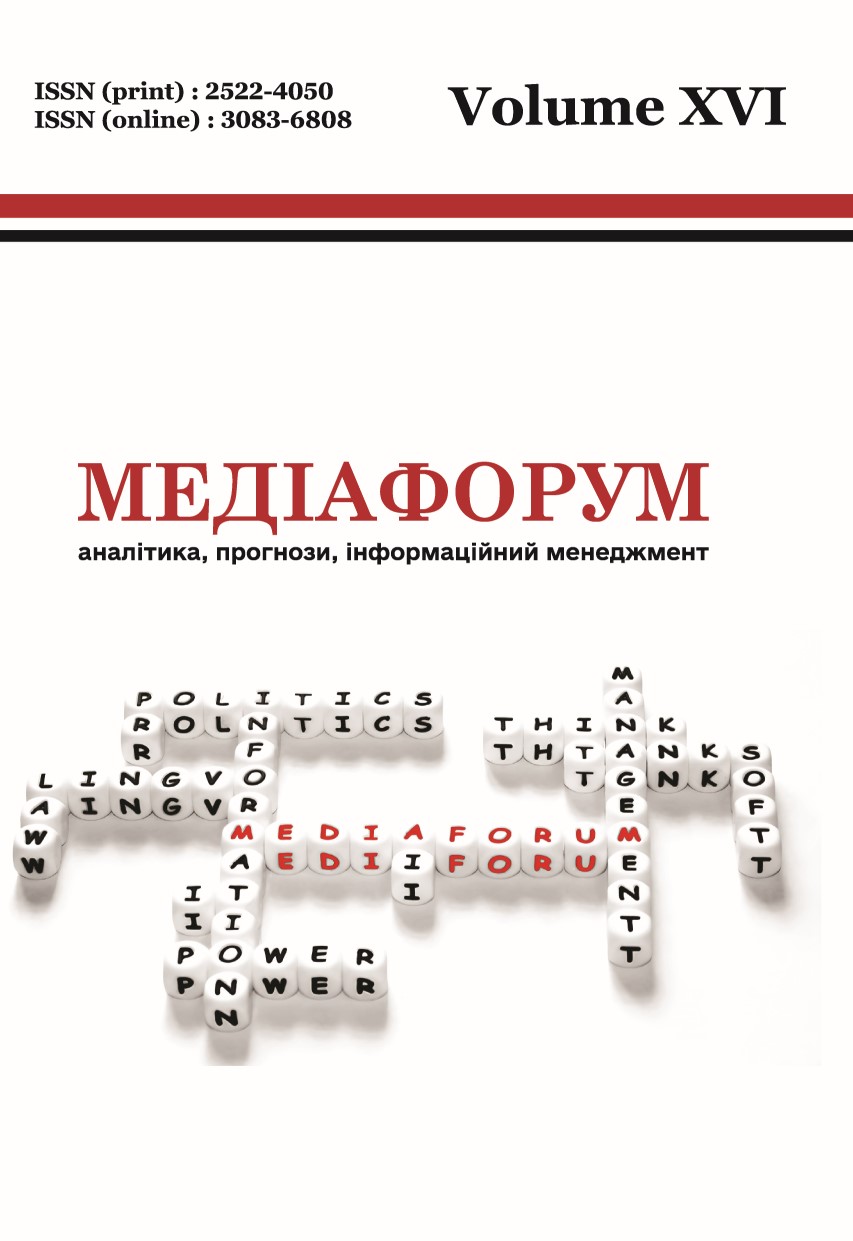Феномен міжнародної кліматичної дезінформації: політологічний та психологічний погляд
DOI:
https://doi.org/10.31861/mediaforum.2025.16.139-160Ключові слова:
іноземне втручання та вплив, міжнародна кліматична дезінформація, емоційні маніпуляції, когнітивні упередження, риторичні стратегії та логічні помилкиАнотація
У статті зміни клімату позиціонуються як критично важлива сфера не лише національної, але й міжнародної політики, що стає дедалі більш вразливою до зовнішнього втручання. Тут розглядається дезінформація щодо кліматичних змін, що поширюється на міжнародну взаємодію країн. Аналізуючи концептуальні рамки іноземного впливу та втручання, авторки досліджують підходи до співвідношення цих термінів, роблячи низку висновків. Зокрема, у контексті кліматичної дезінформації доречно розрізняти іноземні втручання та вплив. Втручання розглядається як спотворення реальності, розкол суспільств і послаблення демократії, вплив – як негативне чи позитивне явище. Перше вбачає в ньому інформаційну зброю проти геополітичних противників, друге – здатність трансформувати зовнішній вплив у джерело розвитку, а не загроз. Зазначається присутність у науковому обігу двох термінів – міжнародна або іноземна (зовнішня) кліматична дезінформація, проте віддається перевага першому – міжнародна кліматична дезінформація. Характеризуючи психологічні механізми поширення кліматичної дезінформації, звертається увага, що вони діють загалом однаково, незалежно від того, чи є дезінформатор міжнародний чи внутрішній. Акцентується увага на ролі когнітивних упереджень, емоційних маніпуляцій, риторичних стратегій та логічних помилок, прямих атак на науковців і наукові установи, що нерідко супроводжується стереотипами демонізації або дегуманізації. Протидія психологічному впливу міжнародної кліматичної дезінформації потребує особливої уваги до проблеми когнітивного (психологічного) щеплення.
Завантажити
Посилання
1. Broda, E., & Strömbäck, J. (2024). Misinformation, Disinformation, and Fake News: Lessons from an Interdisciplinary, Systematic Literature Review. Annals of the International Communication Association, 48(2), 139-166. URL: https://www.tandonline.com/doi/full/10.1080/23808985.2024.2323736?scroll=top&needAccess=true#d1e126
2. Bullock, M., Stevens, M. J., Wedding, D., & Clinton, A. (Eds.). (2024). The Handbook of International Psychology. Taylor & Francis. URL: https://www.researchgate.net/profile/Fernando-Reyes-2/publication/390947451_The_Handbook_of_International_Psychology/links/68044665df0e3f544f42dd76/The-Handbook-of-International-Psychology.pdf#page=42.23.
3. Byman Daniel. (2025). Foreign Malign Influence Targeting US and Allied Corporations. URL: https://csis-website-prod.s3.amazonaws.com/s3fs-public/2025-03/250320_Byman_Foreign_Influence.pdf?VersionId=RRrbau8bPrR6dv7tHPjAMpFwaPY3d7Y3.
4. CAAD Briefing Note. (2024): Tenet Media & Climate Disinformation. (2024). URL: https://caad.info/wp-content/uploads/2024/09/CAAD-Briefing-Note_-Tenet-Media-Climate-Disinformation.pdf.
5. CAAD Data Monitor (2024): Alleged Russian Disinformation on US Soil Includes Divisive Climate Content. URL: https://caad.info/analysis/newsletters/caad-data-monitor-alleged-russian-disinformation-on-us-soil-includes-divisive-climate-content/
6. Countering Foreign Interference in Australia. (2024). URL: https://www.home affairs.gov.au/nat-security/files/cfi-australia.pdf.
7. Disinfo Update (2025). URL: https://www.disinfo.eu/disinfo-update-30-04-2025-2/
8. Edelson, S. M., Reyna, V. F., Singh, A., & Roue, J. E. (2024). The Psychology of Misinformation across the Lifespan. Annual Review of Developmental Psychology, 6. URL: https://www.annualreviews.org/content/journals/10.1146/annurev-devpsych-010923-093547.
9. EFPA Expert Reference Group (2024). Climate Change and Psychology. Glossary. URL: https://www.efpa.eu/efpa-expert-reference-group-climate-change-and-psychology-glossary
10. Foreign Interference a Threat to Democratic Security in Europe. (2025). URL: https://pace.coe.int/en/files/34253/html.
11. Fridman Ofer. (2024). Defining Foreign Influence and Interference. URL: https://www.inss.org.il/wp-content/uploads/2024/01/special-publication-040124.pdf
12. Fu Diana. (2025). Distinguish Foreign from Foreign Interference. Getting China Right at Home. URL: https://acf.sais.jhu.edu/distinguish-foreign-influence-foreign-interference.html.
13. Gedeon Joseph. (2025). Trump Administration Shutters US Office Countering Foreign Disinformation. URL: https://www.theguardian.com/us-news/2025/apr/16 /trump-state-department-foreign-disinformation.
14. Gerrits, A. W. (2018). Disinformation in International Relations: How Important is it? Security and Human Rights, 29 (1-4), 3-23. URL: https://brill.com/view/journals/shrs/29/1-4/article-p3_3.xml.
15. Kertzer, J. D., & Tingley, D. (2018). Political Psychology in International Relations: beyond the Paradigms. Annual Review of Political Science, 21(1), 319-339. URL: https://scholar.harvard.edu/files/dtingley/files/psyir.pdf
16. Kupiecki, R., Bryjka, F., Chłoń, T. (2025). International Disinformation. A Handbook for Analysis and Response. URL: https://www.researchgate.net/profile/Robert-Kupiecki/publication/388224411_International_Disinformation/links/6790035f82501639f5010116/International-Disinformation.pdf.
17. Lewandowsky S., Gilles E. (2012). The Pivotal Role of Perceived Scientific Consensus in Acceptance of Science Gignac and Samuel Vaughan. Climate Change, 3, 399-404. URL: https://skepticalscience.com/docs/Lewandowsky_2012_Consen sus.pdf
18. Liu, J. C. E., & Lee, C. F. (2025). Climate and Energy Misinformation in Taiwan. Frontiers in Communication, 9, 1531126. URL: https://www.frontiersin.org/journals/communication/articles/10.3389/fcomm.2024.1531126/full
19. McBride Megan et al. (2021). The Psychology of (Dis)information: Case Studies and Implications. URL: https://www.vaemergency.gov/aem/blue-book/reading-corner/the-psychology-of-dis-information-case-studies-and-implications.pdf.
20. McGuire, W.J. (1961). Resistance to Persuasion Conferred by Active and Passive Prior Refutation of Same and Alternative Counterarguments. Journal of Abnormal Psychology, 63, 326–332. URL: https://www.proquest.com/docview/614255786?pq-origsite=primo&sourcetype=Scholarly%20Journals
21. Munusamy S. et al. (2024). Psychological Factors Contributing to the Creation and Dissemination of Fake News among Social Media Users: a Systematic Review. BMC Psychology, 12(1), 673. URL: https://link.springer.com/article/10.1186/s403 59-024-02129-2#Sec6.
22. Nisbet, E. C., & Kamenchuk, O. (2019). The Psychology of State-sponsored Disinformation Campaigns and Implications for Public Diplomacy. The Hague Journal of Diplomacy, 14(1-2), 65-82. URL: https://brill.com/view/journals/hjd/14/1-2/article-p65_6.pdf.
23. Pamment, J., & Isaksson, E. (2024). Psychological Defence: Concepts and Principles for the 2020s. (No. 6). Myndigheten för psykologiskt försvar. URL: https://mpf.se/download/18.34845f44192b793f4ee27d9/1730120674895/241017_Psychological-Defence-Concepts-and-principles-for-the-2020s_rapport.pdf.
24. Pamment, J., Falkheimer, J., & Isaksson, E. (2023). Malign Foreign Interference and Information Influence on Video Game Platforms: Understanding the Adversarial Playbook. Myndigheten för psykologiskt försvar. URL: https://mpf.se/download/18.34f4c6361939015813e2ef/1733303782826/mpf-skriftserie-23-03-malign-foreign-interference-and-information-influence-on-video-game-platforms.pdf.
25. Psychological Defence Agency. (2024). URL: https://mpf.se/psychological-defence-agency/about-us/our-mission
26. Romero-Vicente Ana. (2023). Don’t Stop Me Now: the Growing Disinformation Threat against Climate Change. URL: https://www.disinfo.eu/publications/dont-stop-me-now-the-growing-disinformation-threat-against-climate-change /#_ftn2
27. Roozenbeek, J., & Van der Linden, S. (2024). The Psychology of Misinformation. Cambridge University Press. URL: https://books.google.com/books?hl=uk&lr=&id=dkj8EAAAQBAJ&oi=fnd&pg=PP1&ots=zp1wshLi7b&sig=jQ2-6lx3I5ewNWiok5TLptR4cBc.
28. Rowell, A., & van Zeben, J. (2016). A New Status Quo? The Psychological Impact of the Paris Agreement on Climate Change. European Journal of Risk Regul ation, 7(1), 49–53. URL: https://doi.org/10.1017/S1867299X00005377
29. Sealed indictment. (2024). URL: https://www.justice.gov/archives/opa /media/1366266/dl.
30. Sörensen, S., & Pamment, J. (2024). Operationalising the Framework for Evaluating Capability against Information Influence Operations: Case Study of the Psychological Defence Agency’s Courses. NATO Strategic Communication Centre of Excellence. URL: https://lup.lub.lu.se/record/962df74f-f79e-4f95-ba63-432258be71b6.
31. Spampatti, T. et al. (2024). Psychological Inoculation Strategies to Fight Climate Disinformation across 12 Countries. Nature Human Behaviour, 8(2), 380-398. URL: https://www.nature.com/articles/s41562-023-01736-0#Sec.
32. Steg, L. (2023). Psychology of Climate Change. Annual Review of Psychology, 74(1), 391-421. URL: https://www.annualreviews.org/content/journals/10.1146/annurev-psych-032720-042905














